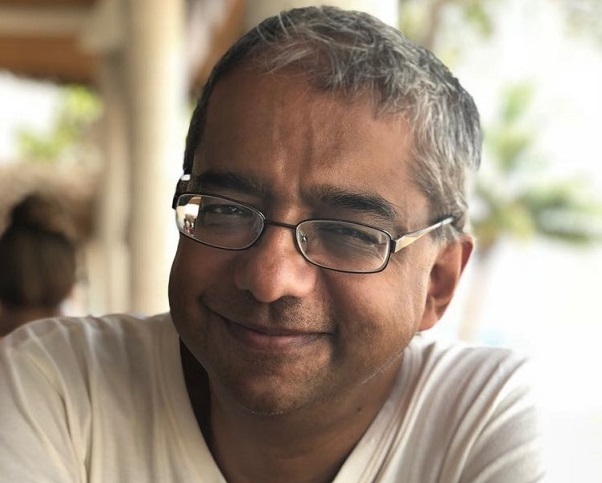By Jekhan Aruliah
During the 2020 COVID-19 “Corona” Virus pandemic we really loved our health workers. We all loved them because COVID-19 hit everyone. Not through infection but through curfews. Businesses closing, shopping & socializing banned, incomes lost, economic hardship, and the stress of being locked in with our loved ones. Diseases are usually suffered bravely by “other people”, infecting only a minority, so most of us need only show sympathy. COVID-19 was suffered by all of us, casting its shadows right into our own jobs, our own homes, our own refrigerators, and our own purses. So we all really felt it.
For a few months health staff were celebrated as superheroes. But the ingratitude of humanity strikes back quicker than a snakebite. Already the healthcare heroes are being forgotten.
While we still remember our love for medical professionals it's a good time to look at a shining example of healthcare in Sri Lanka’s Northern Province. Jaffna's Manipay Green Memorial Hospital (GMH), founded in 1848 by the American Ceylon Mission, strives to provide healthcare at affordable prices with some services offered for free. The Institute of Medical Sciences (IMS), the subject of this article, is based at the GMH.
The IMS idea came out of a meeting of doctors in London back in 2011. At the time Dr Rajendra Surenthirakumaran, currently the Head of IMS who I shall refer to in this article as Dr Suren, was doing post-doctoral studies at St Bartholomew’s Hospital a leading London teaching hospital. To support IMS financially and strategically a trust was formed with an international advisory board that worked with the team in Jaffna led by Dr Suren.
IMS’s prime objective is to provide educational programs, including professional pre-service and in-service training in areas of medical sciences. IMS also provides healthcare services, and It participates in career guidance for young people to encourage them into what remains an unfashionable profession in any role other than doctor.
Having been conceived in 2011, IMS quickly started its activities in 2012 by visiting orphanages and poor and destitute families to recruit students. They signed up their first 25 young people to do a one year Healthcare Assistant (providing support for nurses) training programme. The first programme started in 2013 funded by the Manitha Neyam Trust, a UK based charity with branches around the World focused on social and educational causes. Students pay Rs2,500 per month, with the poorest receiving scholarships, and the remaining costs funded by donations. Students get work experience at care centres in Jaffna, and spend 3 months receiving training at one of the leading private hospitals in Colombo, Lanka Hospitals. The students each pay Lanka Hospitals Rs25k a month (including training, board and lodging) where they are able to learn surgical skills, and also get experience working in the highly professional environment expected in a leading private hospital. Dr Suren says there was a proposal sent to the Ministry of Health for this training to be done at government hospitals, but nothing came of it.
The courses are accredited by Sri Lanka’s National Apprentice and Industrial Training Authority (NAITA) and the Tertiary And Vocational Education Commission (TVEC). The training centre is registered as a private nursing school with the Private Health Regulatory Council, Ministry of Health. By these accreditations IMS has taken great care to ensure once qualified these Healthcare Assistants can work anywhere in Sri Lanka, including in government hospitals.
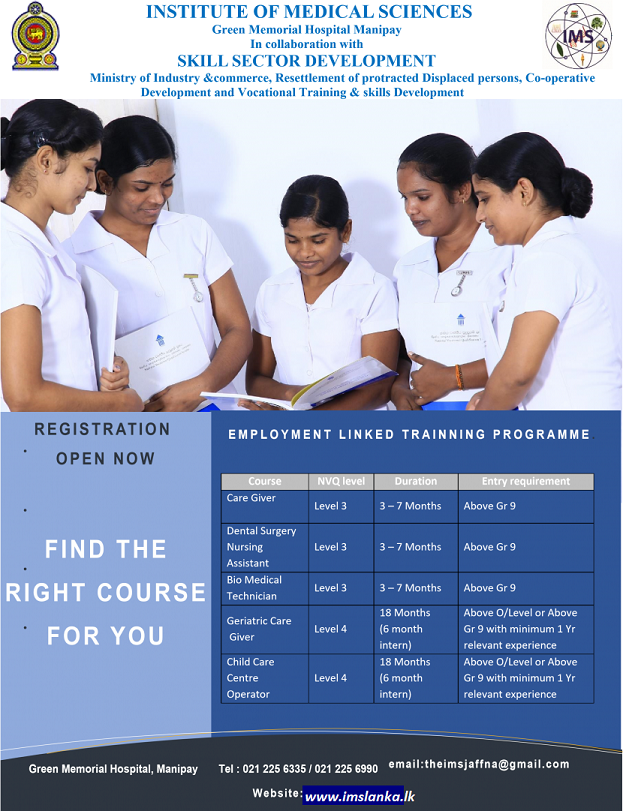
IMS also runs a three year training programme for nurses. Although IMS follows the Ministry of Health’s curriculum, the Ministry doesn’t allow privately trained nurses to register with the Nursing Council. Therefore they are unable to work as nurses in Government hospitals, even though Sri Lanka has a shortage of nurses particularly in Community Care and Palliative Care. Privately trained nurses in Sri Lanka can only work as nurses in privately owned organisations.
IMS has also become a Vocational Training Provider, as part of a Government of Sri Lanka programme to train unemployed young people in various Service Sector roles, including Hospitality, ICT and Healthcare. IMS has been commissioned by the Government to train unemployed youth to enter the Healthcare industry. The Ministry of Youth Affairs & Skills Development has authorized IMS to deliver the following qualifications:
o Certificate in Healthcare
o Diploma in Nursing
o Certificate for Pharmacy Technician
Other courses currently run by IMS include:
o Care Giver, NVQ Level3
o Care Giver (Elderly Care), NVQ Level4
o Child Care Centre Operations, NVQ Level4
o Biomedical Technician, NVQ Level2 & Level3
o Dental Surgery Nurse Assistant, NVQ Level3
IMS currently has 132 students being trained in these courses.
Dr Suren commented that Sri Lanka has a rich resource of people willing to go overseas to work and send their earnings back to their families in our country. 56% of these went for unskilled jobs, as maids and labourers (in 2016, the most recent figures from the Sri Lanka Bureau of Foreign Employment), commanding low wages with low status and low respect.
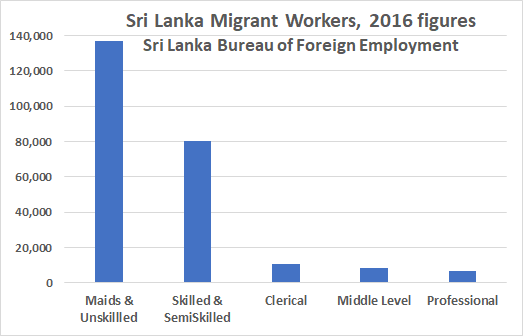
With suitable qualifications they can go to the Middle East as skilled childcare, nursing and health assistants earning 50% more than humble maids and cleaners. This would enable them to send more money home to their families in Sri Lanka from whom they have been separated. And more foreign exchange for Sri Lanka. Our migrant workers sent US$6.7 billion to Sri Lanka in 2019, how much more would they send as skilled workers! They will also be treated with far more respect by employers than is notoriously the case for maids and labourers.
IMS has a Career Guidance programme aimed at young people. Though public perceptions put medical doctors at the top of the professional peak, most other jobs in the Healthcare Sector are not regarded highly. With COVID-19 we recognized how important and skilled and lifesaving even a cleaner’s job is, but we will soon forget. IMS participates in the annual jobs fair run by the Jaffna District Secretariat, and makes visits to schools to encourage young people to enter into the caring industries, including healthcare and childcare.
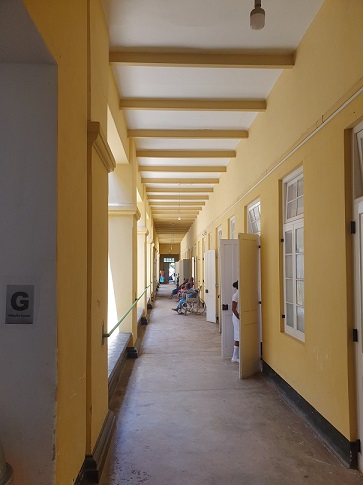
As well as professional training, IMS runs services at the GMH including a Neuro Rehabilitation Centre, and Palliative Care. The Neuro Rehabilitation Centre treats patients who have become acutely disabled by strokes, spinal injuries, and other medical conditions. With a capacity of 18 patients, IMS provides long term residential care for Rs60k per month, which includes accommodation, food, physiotherapy, medicines and attention from medical staff. The Palliative Care Centre, provides support for patients often at the end of their lives and for their families. This is a service government hospitals struggle to provide due to the high demand. IMS at GMH offers a service providing care in a private room for Rs750 per day.
IMS runs the Gabriella Rasaiah Clinic for Children, which was setup by Gabriella’s UK based parents in her memory as she died of an illness at a young age. This ward offers a free service to assess and support children with conditions including Autism, Cerebral Palsy and Downs Syndrome. While there are other facilities in Jaffna providing care for children with these conditions, at the Gabriella Rasaiah Ward care and training is also provided for the parents. The parents are trained in feeding, bathing, toileting their children. The parents themselves are offered therapy, including art and music, and have the opportunity to discuss their own parenting stresses and problems.
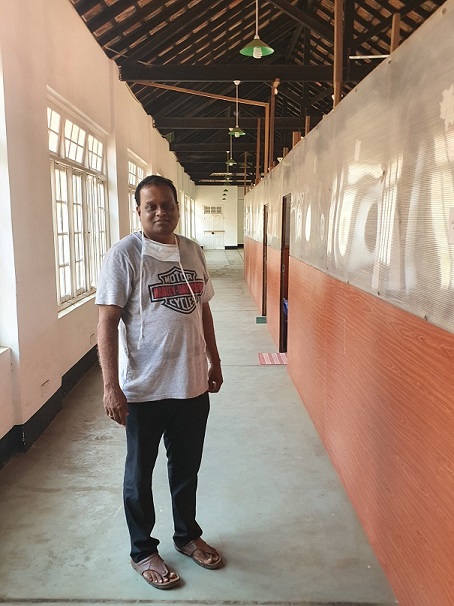
When I asked what support IMS needs, Dr Suren said funding is needed to upgrade the premises and equipment, to increase the number of scholarships for poor students**, and to expand the care services offered. IMS has accepted books, clothing and equipment such as wheelchairs and walkers used by older patients. In February 2020 two Multi Parameter Patient Monitors were donated, funded by benefactors in Singapore and Australia with support of Rotaract Clubs in Hatton Kotagala and Jaffna Midtown. Dr Suren especially mentioned the support received from the Friends of Manipay Hospital, and from Professor Jayantha Arnold in the UK. [** For example: 1 year Healthcare Assistant scholarship Rs107k = Rs2k registration + Rs2.5k per month + Rs75k for 3 months training at Lanka Hospitals].
While the COVID-19 curfews stopped in-house training, IMS started ZOOM classes. This innovation, pushed by the pandemic onto school and companies and families worldwide, has created opportunities for teachers in one continent to tutor students in another. IMS wants to provide tuition in English, Communications, and Soft Skills. Students who can communicate in English have far greater prospects and command a significant financial premium. Experienced Teachers of English as a Foreign Language (TEFL) who can commit a few hours of their time on a regular basis would be appreciated.
To find out more about IMS please contact Dr Surenthirakumaran at theimsjaffna@gmail.com
( — The writer Jekhan Aruliah was born in Sri Lanka and moved with his family to the UK when he was two years of age. Brought up in London, he graduated from Cambridge University in 1986 with a degree in Natural Sciences. Jekhan then spent over two decades in the IT industry, for half of which he was managing offshore software development for British companies in Colombo and in Gurgaon (India). In 2015 Jekhan decided to move to Jaffna where he is now involved in social and economic projects. He can be contacted at jekhanaruliah@gmail.com — )

